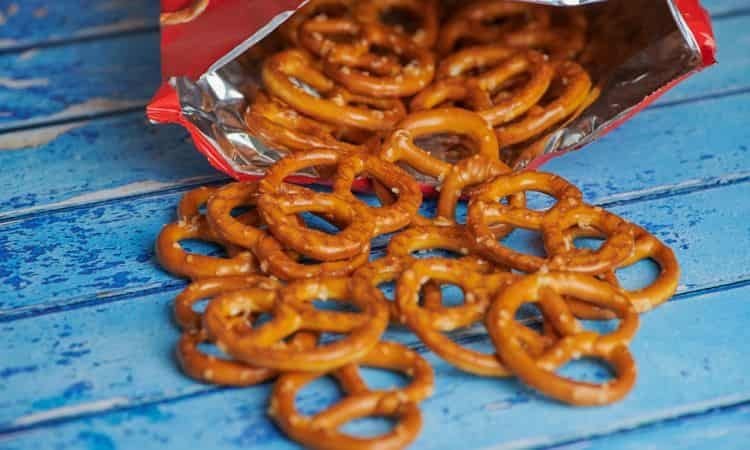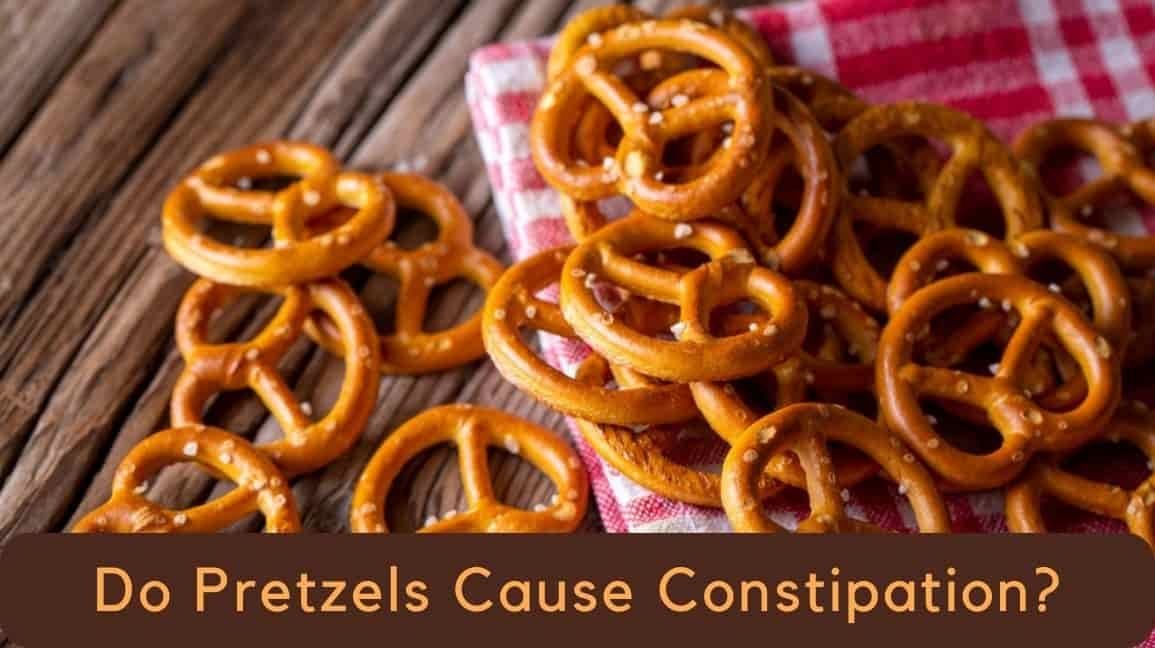Many people enjoy pretzels as a snack, but sometimes they wonder about their impact on their diet and digestion. They often ask, “Do pretzels cause constipation?”.
The answer depends on different factors, mainly the person’s diet and health. Pretzels are made up of refined wheat flour and contain lower dietary fiber content than other whole grain options.
But blaming only a single food item for constipation isn’t accurate. It mainly depends on the overall lack of fiber in your diet.
This article explains mainly the relationship between pretzels and digestion and uncovers some myths and facts.
What are pretzels?
Pretzels are a type of bread known for their unique knots and crunchy texture that are usually made from rye flour or wheat, salt, yeast, water, sugar, and butter.
Pretzels are often associated with Germany, but over time, different versions of them emerged all across Europe during medieval times — especially in France, Italy, and Austria.
While traditionally seen as a snack food, they can also be used in a variety of culinary applications, like breadcrumbs or croutons. Pretzels come in different forms, including soft, hard, sweet, and savory, catering to a wide range of taste preferences.
Before pretzels are baked, they go through a treatment with sodium hydroxide solution, also known as lye. This solution triggers a chemical reaction on the dough’s surface that makes it brown and shiny during baking. (1, 2)
Here are some yummy foods that go great with pretzels:
- fresh fruits and veggies
- hummus
- chicken salad
- nougats in pretzels
- peanut butter
- trail mix
- Guacamole
- Salsa
- Cheese
- Yogurt
- Dark chocolate
- Fresh fruits
- Nut butters
- Jelly
- Tuna
Benefits of pretzels
Despite their humble ingredients, pretzels offer many noteworthy benefits:
- Low Fat. Pretzels are generally low in fat, especially when compared to other snack foods.
- Energy Source. The carbs in pretzels provide a quick source of energy, making them great for an afternoon pick-me-up or a pre-workout snack.
- Convenient snack. When you’re out and looking for a budget-friendly and delicious snack that can be stored for a while, pretzels are a solid choice. Their distinct flavor and texture make them versatile for both sweet and savory applications, expanding their use beyond just a snack.
- Portion Control. Pretzels often come in single-serve packets, which can aid in portion control and prevent overeating.
- Trace Minerals. Depending on the type of pretzel, they can contain small amounts of minerals like iron, magnesium, and zinc.
- Easily pair with fats and protein. Pretzels are a great addition to foods like dips, spreads, nut butter, and proteins that might otherwise be harder to eat on their own.
Are pretzels easy to digest?

Pretzels, in general, are not a significant challenge to digestion. They are mainly composed of simple carbohydrates which break down easily in our digestive system. However, eating too much might cause some digestive problems because they lack substantial fiber.
Also, pretzels are high in sodium, which can cause water retention and bloating when consumed in excess. Plus, those with gluten intolerance or celiac disease should avoid traditional pretzels, as they contain wheat which can trigger negative reactions in these people (3).
So, while pretzels are usually easy to digest, it’s important for people with specific dietary restrictions or sensitivities to be a bit cautious.
Do pretzels cause constipation?
Yes, pretzels do cause constipation in some cases. However, constipation is not just caused by pretzels. Your overall fiber intake is more important for regular bowel movements.
Because pretzels are primarily made from refined wheat flour which is relatively low in dietary fiber. And we all know that dietary fiber is vital in maintaining regular bowel movements and its deficiency can indeed lead to constipation.
So, a regular serving of medium soft pretzels, salted (120 grams), which is about one ounce, has roughly 2 grams of dietary fiber. And if you have 1.5 ounces of hard pretzels, salted (42.5 grams), you’ll get 1 gram of fiber. So basically overall pretzels contain a very low amount of dietary fiber. (4)
According to a study in the American Journal of Gastroenterology, dietary fiber can help improve constipation symptoms (5).
Also, the Mayo Clinic recommends an intake of 20 to 30 grams of dietary fiber a day for adults to prevent constipation (6).
That being said, if you’re consuming large quantities of pretzels and not compensating with high-fiber foods, you could potentially experience constipation.
Related: Do Fig Newtons Make You Poop? Facts about Fig Newtons
What are the side effects of eating pretzels?
Excess intake of pretzels in your diet can have some side effects, including:
- High Sodium Content. Pretzels are rich in sodium, which can contribute to high blood pressure and heart disease when consumed in excess (7).
- Weight Gain. As a processed snack, pretzels might cause weight gain if consumed in high quantities regularly. They are high in calories and low in essential nutrients like fiber and protein.
- Risk for Celiac Disease Patients. Those with celiac disease or gluten intolerance can experience a lot of symptoms from consuming pretzels like diarrhea, bloating, and abdominal pain because they contain gluten (8).
- Possible Blood Sugar Spikes. Pretzels have a high glycemic index, so they can make your blood sugar levels rise fast, which makes them a poor choice for people with diabetes.
Foods to avoid when constipated
For people with constipation should we avoid certain foods:
- Low-Fiber Foods. Foods low in dietary fiber, like white bread, white rice, and other refined grain products, can exacerbate constipation. Instead, opt for whole-grain alternatives which are rich in fiber and promote regular bowel movements. (9)
- Processed Foods. Meals and snacks like fast food, chips, and cookies tend to be low in fiber and high in fat, leading to constipation. (10)
- Certain Dairy Products. Foods like cheese and ice cream can contribute to constipation in some people, particularly those who are lactose intolerant. (11)
- Alcohol. Alcohol can dehydrate the body, causing constipation. It’s better to limit alcohol or balance its intake with plenty of water. (12)
- Caffeine. While it can stimulate bowel movements in some, it can lead to dehydration and constipation in others. It’s important to check your body’s reaction to caffeine.
- Red Meat. This is high in fat and can slow down the digestion process. It’s best to balance its intake with plenty of fruits, vegetables, and whole grains.
Remember, everyone’s body reacts differently to various foods, so what causes constipation in one person might not be in another.
Conclusion
Pretzels, when consumed in moderation, can be enjoyed without major concerns about constipation. It is a delicious snack option that is low in fat and cholesterol.
However, you need to balance pretzels with other high-fiber foods and limit the consumption of processed grains, which can contribute to constipation.
As with any food, it’s important to listen to your body’s reaction and adjust accordingly to maintain a healthy digestive system. Next time you grab a pretzel, remember to include a good amount of fiber in your diet too.

Dr. Usman is a medical content reviewer with 12+ years of experience in healthcare research and patient education. He specializes in evidence-based health information, medications, and chronic health topics. His work is based on trusted medical sources and current clinical guidelines to ensure accuracy, transparency, and reliability. Content reviewed by Dr. Usman is for educational purposes and does not replace professional medical advice.
